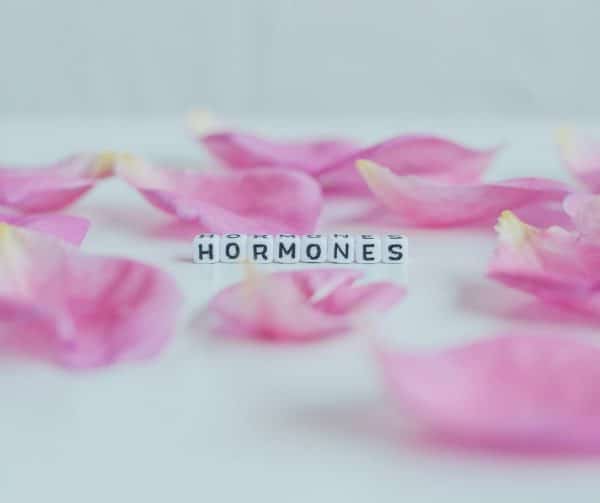Hormonal Versus Non-Hormonal Contraception
Get the facts.

According to the U.S. Food & Drug Administration, women who use combined hormonal contraceptives have up to a nine-fold increased risk for blood clots compared to women who do not use hormonal birth control.1
Hormonal contraceptives are birth control methods that affect the endocrine system, which is made up of glands inside the body that produce and release hormones. These hormones are transported in tissue fluids (e.g., blood). As these hormones travel through the body to organs, skin, muscle, and other tissues, they put specific cells or tissues into action or enable cells to effectively “talk” to each other.
Hormones are part of the function of virtually every cell and organ in the body. They control our moods, growth and development, metabolism, and more. If a person’s endocrine system is not functioning properly, it can lead to issues related to stress management, blood pressure, weight gain, sleep disturbances, and emotions and mood.
Hormones also impact fertility and sexual function, which explains why hormones can be developed to impact the endocrine system for contraceptive purposes.
ESTROGEN AND PROGESTIN
There are two main types of hormonal contraceptives:
- Combined hormonal contraception, which combines estrogen and synthetic progesterone (called progestin)
- Progestin-only contraception.
While hormonal birth control has been used safely by millions of women over the past six decades, as with any prescription medication it can cause side effects – some considered very minor and some that are far more serious.
COMBINED HORMONAL CONTRACEPTION
Combined hormonal contraception methods broadly work by suppressing ovulation and thickening cervical mucus. According to the American College of Obstetricians and Gynecologists, hormonal contraceptives are safe for most women to use and their side effects and risks include:
Minor side effects of combined hormonal contraception: Headache, nausea, breast tenderness, and breakthrough bleeding.
More serious risks of combined hormonal contraception: An increased risk for blood clots, heart attack, and stroke.
Understand Different Risks
Different hormonal contraception methods have different effects on the risk of blood clots, heart attack, and stroke. Other factors, such as obesity, can compound these cardiovascular risks. For example: Hormonal vaginal rings and transdermal patches carry a six- to eight-fold risk for blood clots compared to nonusers.2 Obesity can double blood clot risks compared to normal weight.3
The risk for blood clots is further increased among women who have multiple risk factors for cardiovascular disease, such as high cholesterol, high blood pressure, diabetes, a history of stroke, a history of heart attack, a history of migraine headaches with aura, or a personal or family history of blood clots. Also, the risk for blood clots is increased among women who are 35 years of age or older and who smoke more than 15 cigarettes a day.4
Genetic Clotting Disorders Increase Clotting Risk
Experts estimate that about five to eight percent of the U.S. population is affected by genetic or inherited clotting disorders.
These clotting disorders usually involve a deficit in clotting factor proteins.
Research has shown that several clotting disorders can dramatically increase the risk for blood clots associated with estrogen-based contraception methods. These specific clotting disorders include: factor V Leiden (the most common clotting disorder that affects about five percent of the Caucasian population4), hereditary anti-thrombin deficiency, prothrombin G20210A, and both protein C and protein S deficiencies.
Women who use hormonal contraception containing estrogen, and who also are affected by one or more clotting disorders, have a substantially higher risk for developing a dangerous blood clot.
For this reason, it is important to consider your own health history and your family health history when selecting birth control. A family history of blood clots may compound the blood clot risks linked to hormonal contraception.
Explore your family’s health history and share the information you gather with your healthcare provider or prescriber when making birth control decisions.
Genetic testing for clotting disorders is not presently standard practice when hormonal contraception is prescribed.
Women with a personal or family history of clotting should discuss this matter with their healthcare provider and explore their testing options.
If your healthcare provider does not direct that such testing be performed, women can test independently, using direct-to-consumer testing options like 23andMe. When testing for genetic clotting disorders, experts recommend that women consult with a genetics counselor to help them accurately evaluate the findings of their test results.
The risk for dangerous blood clots is 35 times greater among women who use hormonal contraception and who also are affected by the genetic clotting disorder known as factor V Leiden. Factor V Leiden is the most common genetic clotting disorder in the United States.5

CAN HORMONAL CONTRACEPTION IMPACT SEXUAL FUNCTION, MOOD?
Research into the effects of hormonal contraception shows that it can impact a woman’s libido or sexual function. It also might cause depression symptoms, particularly among adolescents or teens. Researchers note that the evidence surrounding these studies is conflicting and they stress that more research is needed to better understand these potential side effects.
Share Concerns with Your Healthcare Provider
Experts recommend that women who use hormonal contraception talk to their healthcare provider if they experience any change in libido, or if they experience any symptoms of depression. The symptoms of depression include: feelings of sadness, loss of interest in once-enjoyed activities, angry outbursts, sleep issues, lack of energy, anxiety, weight loss or loss of appetite, and feelings of worthlessness and guilt.
HORMONAL CONTRACEPTION: OTHER CLINICAL CONSIDERATIONS
According to the American Academy of Family Physicians, combined hormonal contraception should not be prescribed to women who are affected by any of the following conditions:
- Breast cancer or a personal history of breast cancer
- Uterine cancer or other estrogen-dependent tissue changes or growths
- Cerebral or brain blood vessel disease or coronary artery disease
- Combination of smoking and age older than 35 years
- Diabetes with complications
Benign or cancerous liver tumors; liver disease with abnormal liver function
- Hypersensitivity to any component in oral contraceptive pills
- Major surgery with prolonged immobilization
- Pregnancy
- Severe hypertension
- Stroke
Systemic lupus erythematosus with antiphospholiipid antibodies
- Undiagnosed abnormal genital bleeding
Heart valve disease with complications
Personal or family history of blood clotting
PROGESTIN-ONLY CONTRACEPTION
Progestin-only contraception contains only progesterone or a synthetic progestin. These methods reduce the frequency of ovulation, though most rely on changes in cervical mucus for effectiveness.
Unlike birth control pills that contain estrogen and progestin, progestin-only pills do not increase the risk of high blood pressure or cardiovascular disease. Also, you can take progestin-only pills even if you have certain health conditions, such as a history of blood clots or uncontrolled high blood pressure. Bleeding changes are the most common side effect, with either short cycles of bleeding or spotting or, less commonly, heavy bleeding or no bleeding at all. Other side effects may include headaches, nausea, and breast tenderness.
Other Medical Considerations
Progestin-only pills may not be a good choice if you have certain medical conditions, such as some forms of lupus. Women who have breast cancer or a history of breast cancer are advised not to take progestin-only pills.
View and download this Self-Screener to complete and discuss with your healthcare provider if you are considering your birth control options: Self-Screener Questionnaire.
NON-HORMONAL CONTRACEPTION
Non-hormonal forms of birth control do not affect a person’s hormones and some of the most common methods of non-hormonal birth control include:
- Barrier methods are medical devices that serve as a barrier to prevent sperm from reaching the uterus. These include condoms, diaphragms, and sponges.
- Copper Intrauterine Devices (IUDs) are small, T-shaped devices that are inserted into the uterus to prevent pregnancy. (There are both non-hormonal and hormonal IUDs).
- Sterilization can involve tubal ligation for women, which blocks a woman’s fallopian tubes to prevent an egg from reaching the uterus, or vasectomy for men, which seals the tubes that carry sperm.
- Fertility Awareness Method is a form of natural family planning that relies on tracking a woman’s menstrual cycle to predict ovulation and to help determine when conception is most likely.
These methods tend to have fewer side effects (e.g., headaches, nausea, depression, yeast infections, reduced sexual desire, etc.) than their hormonal counterparts. Also, they are not negatively impacted by interactions with other medical therapies (e.g., antibiotics). However, some of these methods, such as the rhythm method, are less effective and provide less reliable contraception.


